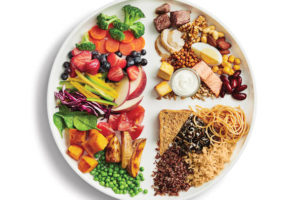Reducing Stress with Fruits and Vegetables
When it comes down to it, stress is the root of all physical evils. Most of the illnesses we experience—acute or chronic—are usually caused by stress disrupting our immune system. Stress is a normal part of life, but it was never intended to be something we experience long-term, the way we do in western civilizations. Mortgages, traffic, the stock market, and media of all sorts can keep us stressed until the twelfth of never.

Any little thing you can do to reduce your daily stress will improve your health. One of the best things you can do to relieve stress is strength training, but most of us at Exercise Inc only do that once a week. Walking and getting plenty of sleep are also at the top of the list for stress relief. But with all the nerve-racking situations we experience on an ongoing basis, it’s important to take as many measures as possible to mitigate stress.
A study published last month in Clinical Nutrition, found that higher fruit and vegetable intake reduced perceived stress in adults (age 45 to 65) by 10%. Perceived stress is an individual’s feelings or thoughts in relation to how much stress they are under over a period of time. It strongly influences a person’s wellbeing and mental health.
Increasing evidence has shown that improving the quality of your diet can be extremely beneficial for your mental health. A metanalysis of fruit and vegetable consumption in relation to depression found that adequate consumption of vegetables was associated with a 14-25% lower risk of depression. The metanalysis also found that every 100 grams of fruit intake (about 1 apple) is associated with a 3-5% reduction in depression.
Treatment for depression and anxiety is currently dominated by antidepressants and psychotherapy, however such treatments have about a 50% success rate. Additional strategies are needed to address and treat mental disorders. There is an overwhelming amount of evidence suggesting diet quality is a modifiable risk factor for mental illness. This becomes even more evident when you realize that mental disorders are tied to biological pathways associated with inflammation, oxidative stress, and gut microbiome.
Fruits and vegetables provide fiber, vitamins, minerals, and phytochemicals, which have beneficial effects on psychological wellbeing. Fruits and vegetables reduce stress levels due to their bioactive nutrients and phytochemicals such as vitamins C, D, E, and K, the B-group vitamins, and carotenoids. And as I’ve often pointed out, there are more than 25,000 different phytonutrients in fruits and vegetables—most of which we still don’t understand. A diet rich in fruits and vegetables will affect all aspects of your health beyond what nutrition science can comprehend.
Let’s look at this from another angle. How much more visually appealing and soothing is a plate of colorful fruits and vegetables versus grains, sugars, and starches?

Just looking at the difference between the two pictures should be enough to tell you that fruits and vegetables can transform you from Eeyore to Tigger.
I’m convinced that the beginnings of depression and anxiety are deeply connected to our meager consumption of fruits and vegetables and our excessive consumption of highly processed foods. But I’m not the only one—nutritional psychiatry is a rapidly growing clinical approach that uses food and supplements to manage psychiatric disorders.
From a mental health perspective, 90% of serotonin receptors are located in the gut. Serotonin is the key hormone that stabilizes your mood, happiness, and anxiety. The typical western diet of highly processed foods, containing increasing amounts of untested food additives, increases gut inflammation in a way that inhibits serotonin receptors. The food industry is continually increasing the number of food additives without testing their impact on gut microbiome. By not consuming plenty of fruits and vegetables and replacing them with processed foods, you can quickly affect serotonin reception in your gut and throw off serotonin balance in your brain. (I had to throw in a little more science in case the pictures weren’t convincing enough.)
Our Simple 9© nutritional program promotes eating 2-3 servings of fruit a day and eating 4 or more servings of vegetables every day. These are two of the first three healthy habits we coach our clients to adopt. We do this because a study in 2001 found that adding fruits and vegetables to a diet is a better weight loss strategy than reducing servings of added fat and sugar. Part of the reason this approach works so well could be the stress-reducing benefits of eating more fruits and vegetables.
To Increase Your Consumption of Fruits and Vegetables, we recommend:
1. Eat one serving of fruit with breakfast.
2. Have a serving of fruit as a mid-morning snack.
3. Always keep a bowl of fresh fruit on your kitchen counter.
4. Eat at least one cup of leafy green vegetables for lunch.
5. Eat two or more servings of vegetables for lunch.
6. Eat two or more servings of vegetables for dinner.
7. Always keep cut-up fresh vegetables in your fridge.
Hopefully you’re experiencing less stress already because you read this article. Eat more fruits and vegetables, and remember, it’s almost impossible to get too many.
Stay Strong,
Bo Railey

